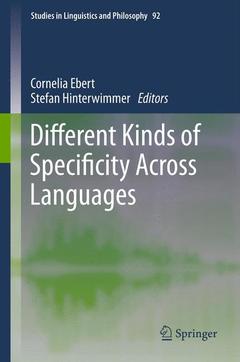Description
Different Kinds of Specificity Across Languages, 2013
Studies in Linguistics and Philosophy Series, Vol. 92
Coordinators: Ebert Cornelia, Hinterwimmer Stefan
Language: English
Subject for Different Kinds of Specificity Across Languages:
Keywords
Distribution of two Indefinite Articles; Formal semantics; German Specificity Markers bestimmt and gewiss; Indefinites; Intensional/modal operators; Natural languages; Pragmatic variation among specificity markers; Semantics and pragmatics of indefinites; Semantics-pragmatics interface; Specificity markers and Nominal Exclamatives in French; Syntax-semantics interface; Topicality; Widest scope
Publication date: 12-2014
208 p. · 15.5x23.5 cm · Paperback
Publication date: 11-2012
208 p. · 15.5x23.5 cm · Hardback
Description
/li>Contents
/li>Comment
/li>
This anthology of papers analyzes a range of specificity markers found in natural languages. It reflects the fact that despite intensive research into these markers, the vast differences between the markers across languages and even within single languages have been less acknowledged. Commonly regarded specific indefinites are by no means a homogenous class, and so this volume fills a gap in our understanding of the semantics and pragmatics of indefinites.
The papers explore differences and similarities among these specificity markers, concentrating on the following issues: whether specificity is a purely semantic or also a pragmatic notion; whether the contribution of specificity markers is located on the level of the at-issue content; whether some kind of speaker-listener asymmetry concerning the identification of the referent is involved; and the behavioral scope of these indefinites in the context of other quantifiers, negation, attitude verbs, and intensional/modal operators.
Introduction by Cornelia Ebert and Stefan Hinterwimmer .- Specificity Markers and Nominal Exclamatives in French by Fabienne Martin .- The Interpretation of the German Specificity Markers bestimmt and gewiss by Christian Ebert, Cornelia Ebert and Stefan Hinterwimmer .- Pragmatic Variation among Specificity Markers by Tania Ionin .- Certain Presuppositions and some Intermediate Readings, and Vice Versa by Igor Yanovich .- Exceptional Scope: The Case of Spanish by Luis Alonso-Ovalle and Paula Menéndez-Benito .- The Distribution of two Indefinite Articles – The Case of Uzbek by Klaus von Heusinger and Udo Klein .- Scenarios of Equivalence – The Case of quelque by Jacques Jayez and Lucia M. Tovena .
These books may interest you

A Presuppositional Analysis of Specific IndefinitesCommon Grounds as Structured Information States 58.78 €

Redefining Indefinites 105.49 €

Redefining Indefinites 105.49 €

